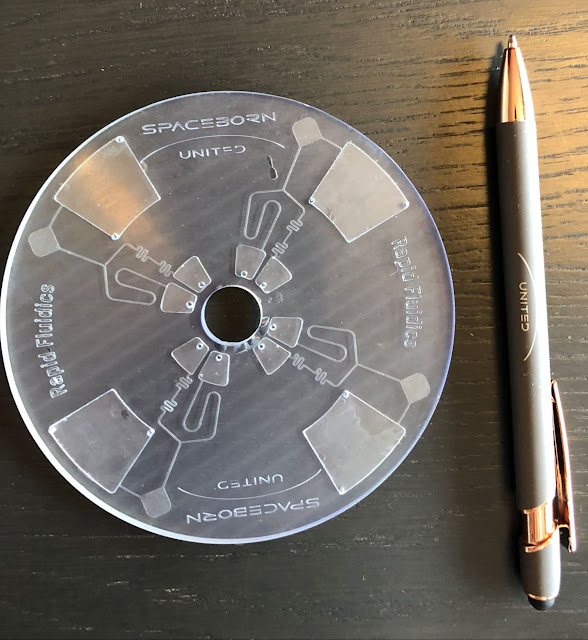Asgardia - The Space Nation logo.
Jan 26, 2023
Inews looks into the Space Nation’s nearest procreation trials in space
After the Space Nation’s successful Space Procreation Webinar held earlier this month - the very first one this new year and already the 16th altogether - the upcoming Asgardian IVF experimental mission is being closely followed by a national British outlet Inews. In his comprehensive article, Cahal Milmo focuses on both: the Space Nation headed by Dr. Ashurbeyli and its target aspirations at large as well as the details on the suborbital test flight thoroughly prepared by the Asgardia’s Member of Parliament Dr. Egbert Edelbroek and his scientific team in particular.
Image above: ARTIS (Assisted Reproduction Technology in Space) module. Image Credit: SpaceBorn United.
Asgardia, a visionary space nation officially established in 2016 by a progressive scientist and prominent public figure Dr. Igor Ashurbeyli, thinking far ahead of his time, already counts with a population over 1 million registered Asgardians from all over the world. Deeply concerned with human extinction neared by terrestrial (potentially nuclear) conflicts, climate change, and ultimately, the Sun ceasing to exist, the Nation set ‘the birth of the first human child in space’ as its primary mission in its state Constitution amended just a few months ago.
According to Dr. Egbert Edelbroek, CEO of a Dutch company SpaceBorn United specialising in space embryology and supported by Asgardia, ‘these threats to human life on Earth can be addressed by becoming a post-planetary or multi-planetary species.’ The best way to approach such a large-scale goal is to act literally in baby steps, initially launching mice and rats’ biological materials aboard uncrewed biosatellites. One of these invaluable mini-IVF labs is set to get launched from Canada just around 3 months from now. Human cells, these highly anticipated protagonists of SpaceBorn’s reproductive endeavour, are expected to make this trip within the next 5 years.
The company’s commitment to conducting a series of ARTIS (Assisted Reproductive Technology in Space) missions first off, as opposed to any natural human conception trials right away, is due to the current knowledge vacuum in the field of human reproduction in space. Thus, as fairly noted by the Asgardia Parliament Chair Lembit Ӧpik in his interview to Inews, ‘we simply must identify morally and biologically sustainable solutions for space births; otherwise we’ll never reach other planets – or other star systems.’
To win over the hearts and minds of the authorities in charge of giving the green light to space fertilisation research, Prof. David Cullen and his Cranfield University team advising Dr. Edelbroek on the ARTIS design have been extremely watchful in terms of embryo safety, making sure artificial gravityconditions, ‘as similar to those in an earthbound clinic as possible,’ are recreated on the IVF device thanks to the biocassette rotation. Validation test flights with rodent cells modelling future human studies have sparked interest among volunteers already signing up with SpaceBorn for space IVF experiments.
Of course, recreating Earth gravity to make human fertilisation possible in the space environment is one of the key features conditioning the success of these trials, even though they are meant to take just a few hours. As a prominent Belgian artificial gravity researcher Prof. Floris Wuyts, Asgardia’s Minister of Science, pointed out earlier at the Space Procreation Webinar, ‘we work with an ambitious time window where we only have about 6-8 hours after harvesting the cells from the natural mother to bring them into space and have them fertilised by the sperm.’
Image Credit: SpaceBorn United
With research on human biomaterials in orbit being an unexplored path under the maximum control of designated authorities, on the other side of the scale, it is still worth keeping in mind how vulnerable we are as a species in the face of these turbulent terrestrial times. Speaking of the delicate moral side of spaceborne human conception, Dr. Edelbroek shares his ex adverso point on this matter: ‘It is also an interesting approach to argue that it might be unethical NOT to allow this because of all the threats to human life on Earth. We might not have enough time if we do not accelerate this space science.’
Original article on Asgardia website: https://asgardia.space/en/news/British-Press-on-Asgardias-Upcoming-Space-IVF-Mission
Related links:
Space Procreation Webinar: https://asgardia.space/en/news/Space-Procreation-Webinar-Important-Details-of-Asgardias-Core-Mission
British outlet Inews article: https://inews.co.uk/news/ivf-orbit-mission-first-step-creating-babies-space-2093862
Asgardia Constitution: https://asgardia.space/en/constitution/
Asgardia - The Space Nation: https://asgardia.space/en/
Images (mentioned), Text Credit: Asgardia.
Best regards, Roland Berga / Asgardian Resident / AMP (aka Orbiter.ch)



